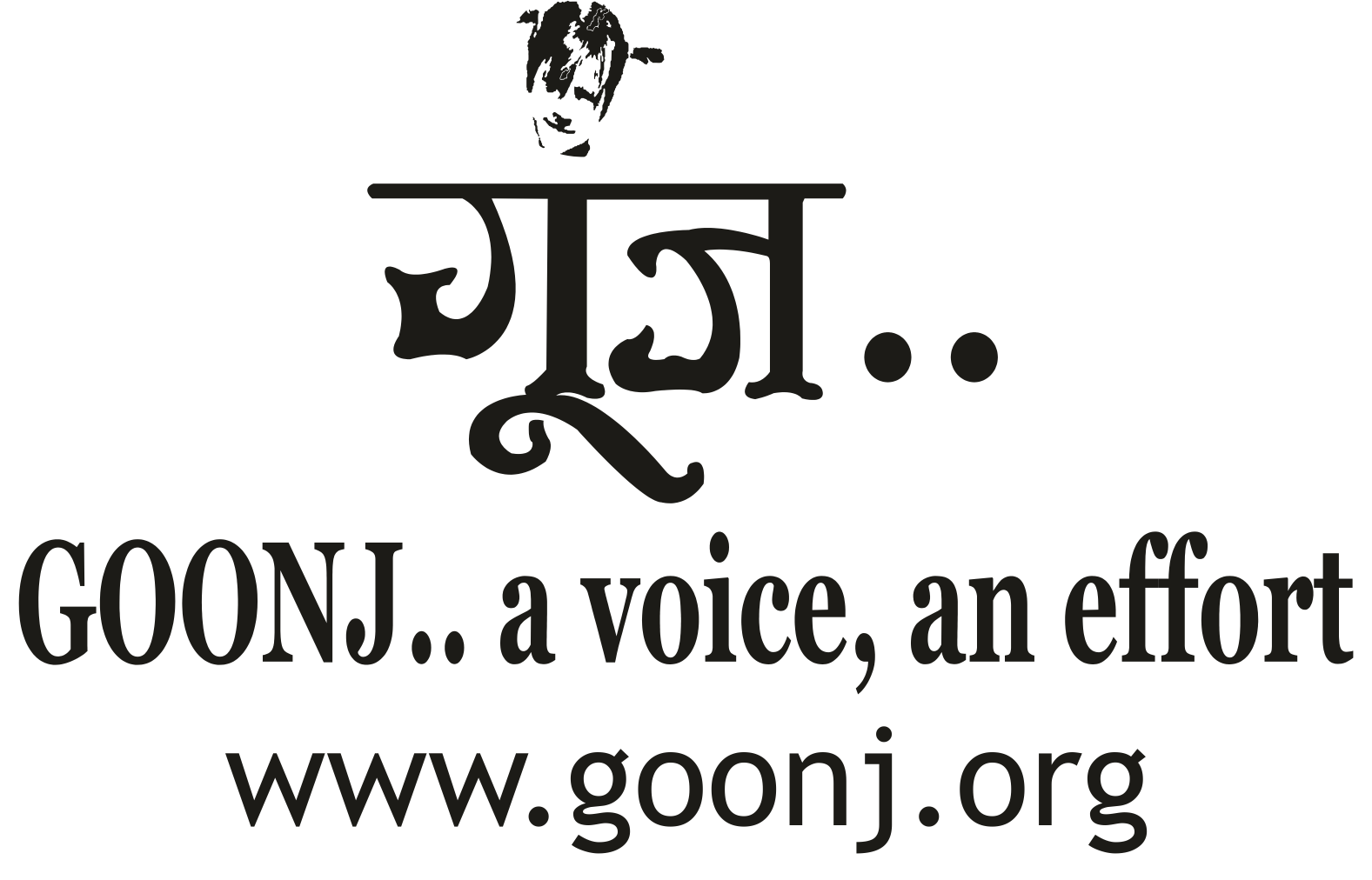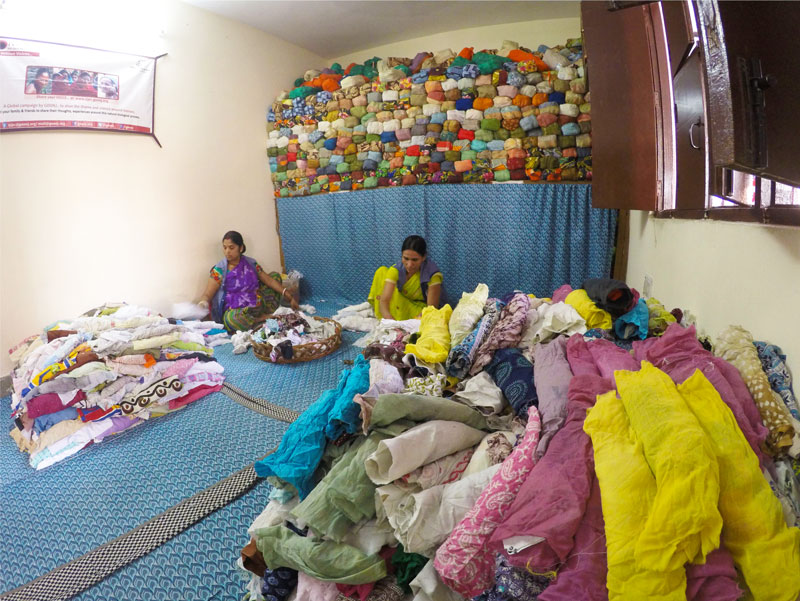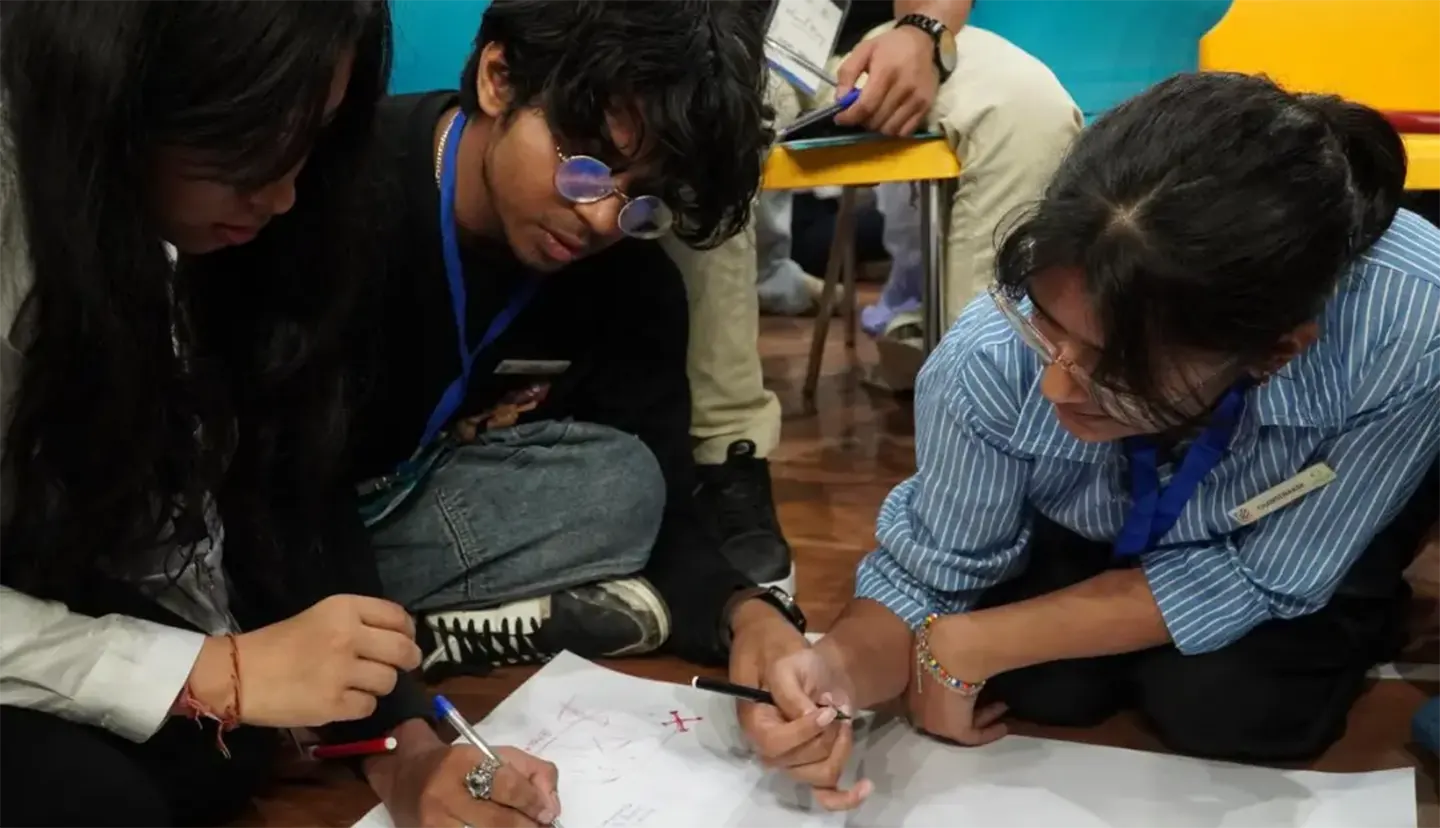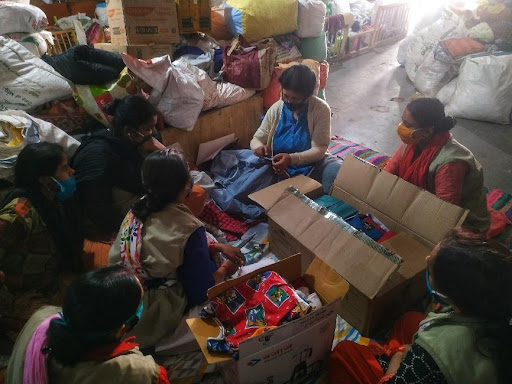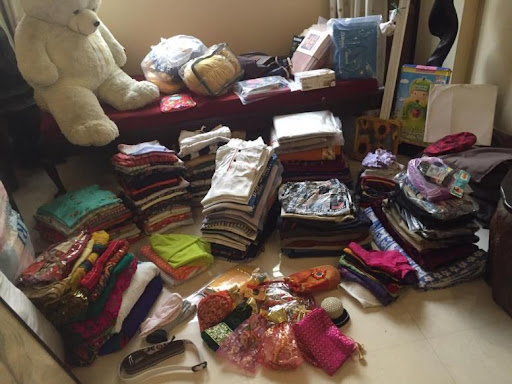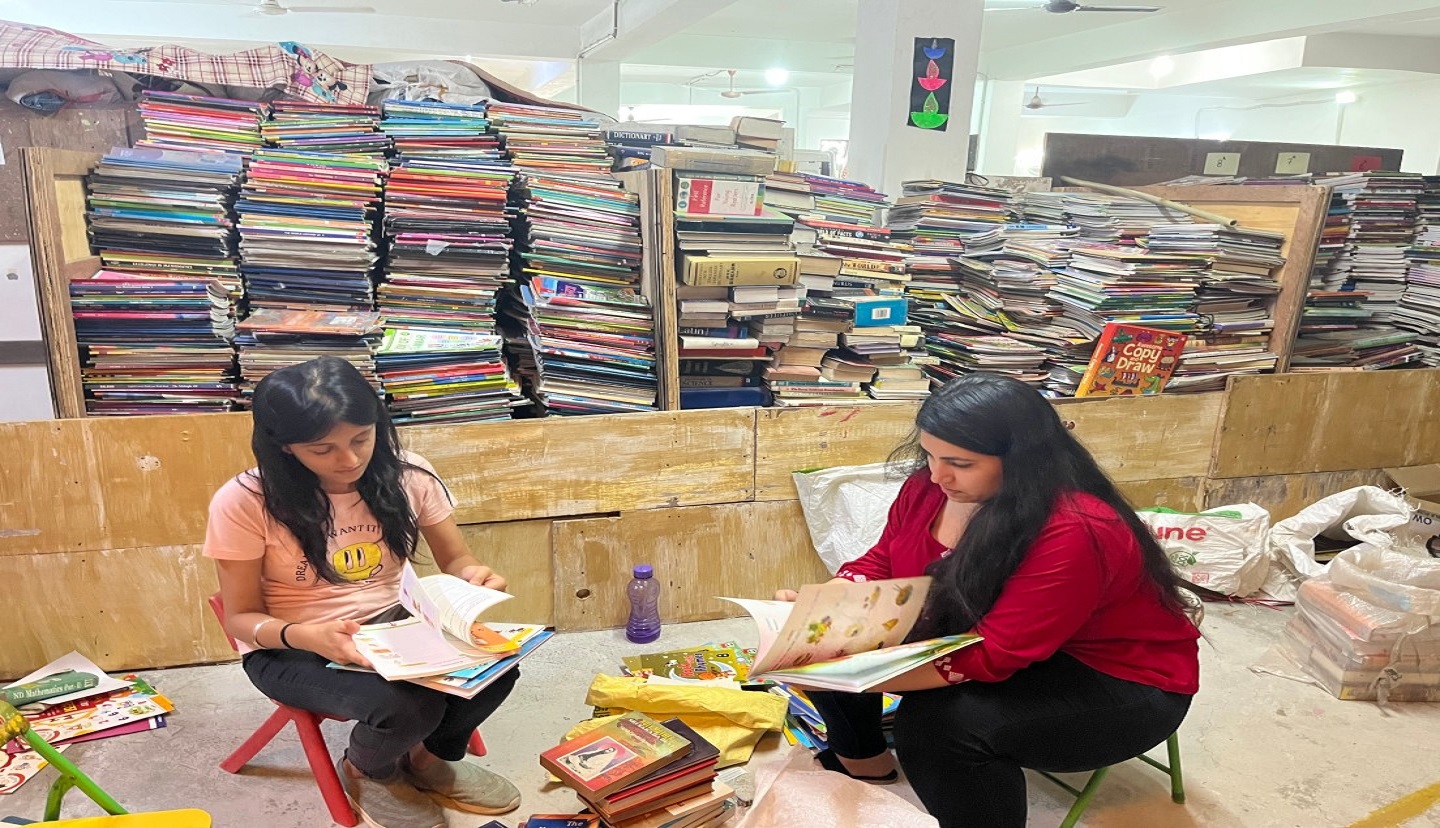Cloth is a basic need of a woman as is her self-respect and dignity. It is this symbiotic relationship between the two that calls for, “Not just a piece of cloth”. So Goonj started with the simple activity — of making a clean cotton cloth available. It could do this given its pan India network and processes around clothes collection. This started in 2005, when Goonj first worked on more than 100 trucks of Tsunami disaster wastage. The first insight on what kind of cloth should be used, came from the 40 women from nearby slums who were working on sorting the mammoth cloth piles. These women started by personally using the various samples. From this small practical lab at the grass-root level, evolved the length, width, thickness ad so on of the first MY Pad. Many of us may have different ideas about what a sanitary pad should look like but thinking of the women who couldn’t even afford enough cloth, a basic pad was ready.
The one common statement often heard about menstrual awareness and menstrual products is that women in urban India are much better off than their village counterparts. We find this to be only partially true because many urban women — the domestic workers, cleaners, hawkers, homeless women, migrant construction workers, etc. still find it difficult to afford the ready-made sanitary pads. They are still using cloth as a sanitary pad while they also lack awareness about their menstrual health and hygiene issues.
While many young girls may have knowledge of readymade pads, thanks to the advertising bombardment, they neither have access to nor can they afford to buy these pads. The Goonj Cloth pads, MY Pads, made from cotton and semi-cotton cloth are solving the three big challenges of menstruation; access, affordability and awareness. MY Pad may be called very basic but that’s precisely what it is meant to be. Over the years some experiments around practical usage like putting loops etc. have been tried but in a vast country like India practices are different at different places. This process also highlighted another connected yet ignored need, of undergarments. We started making undergarments from the un-wearable yet recyclable T-shirts, the best hosiery material in the world.
Most rural women find MY Pad simple and familiar because it is like cloth.Every woman who has ever used cloth, is comfortable with My Pad. It is easily disposable and is reusable, making it affordable for the women at the lowest economic strata of the society. Instead of trying to introduce a new product or design, these pads are an improvisation and mass-scale replication of the existing usage patterns or practices. Goonj has simply removed the risk elements of the existing practice and done a lot of value addition in terms of cleanliness and awareness.
Today, Goonj’s MY Pad and Not Just a Piece of Cloth (NJPC) initiatives are reaching out to the women in the most far-flung villages across India. Hundreds of thousands of Goonj MY Pads are used as an alternative, a tool to change menstrual practices to open up the shame and silence on this issue. These are probably the cheapest, easy-to-make, replicable, reusable, and eco-friendly sanitary pads today.
The simple six-step process of making MY Pads:
1.Sorted cotton cloths is soaked overnight and washed in washing machines twice.
- The washed clothsare dried in sunlight and cut into specific sizes.
- These pieces of cloth are then ironed to ensure there is no moisture left.
- The leftover smaller shreds of cloth are inserted into the bigger cloth piece and folded to make a MY Pad, a handmade cloth sanitary pad.
- A set of 10 MY Padsis inserted into a cloth pack together with a small pictorial leaflet highlighting some simple do’s and don’ts regarding washing, drying, storing, and disposal.
- A waterproof pouch is inserted into the pack (made out of used flex, optional, and based on availability) for a woman to carry her used pad for washing and reuse later.
The Challenges: The most challenging part of course, is to build awareness about the health and hygiene aspects of menstruation. In some ways, this endeavour is similar to Goonj’s work with cloth. We had to first establish that cloth was the most basic need, which was totally ignored. The bigger challenge with menstruation is the all-pervasive culture of shame and silence that shrouds it, marred as it is by social, cultural, and religious myths, taboos and practices.
Women in Krishan Colony, Purnea, Bihar, highlighted the alarming situation during Goonj’s session on awareness of menstrual hygiene. They initiated a sanitation drive in their village.
In another nearby colony a girl said, “माहवारीकेबारेमेंजानकारीइससेपहलेमुझेकिसीनेनहींदीथीl मैंअबआगेसेअपनीतारीखकाभीध्यानरखूगींऔरइनदिनोंमैंरोज़नहाऊँगीऔरमायपैडकोइस्तेमालकरूगीं |” (Nobody talked to me about menstruation before this, now I will remember my date and will also bathe daily and will use this MY Pad).
Initially, many of Goonj’s grassroots partner groups also expressed resistance in working on this highly sensitive issue. The ray of hope came from the women themselves. While our team went apprehensively into the all-women village meetings, the women, despite their initial hesitation, spoke out vociferously about their challenges around menstruation. One thing was clear, no one had ever spoken to these women about this monthly ‘disaster’ and they were desperate to share countless confusions and mind-boggling questions that whirled in their minds. We realized soon enough that Goonj’s MY Pads could act as a trigger to get women to talk about this ‘close-circuit’ issue.
Years later this little story sums up how things are turning out: “I was selling the packed pads we make, at Goonj at an exhibition. A man came across and said he liked the ‘pillows’ on sale. I told him to buy a couple, rest his head on them and then pass them on to his mother/sister/wife at home,” shared Sheela Ji, one of Goonj’s oldest processing team members. When she explained the real use for the cloth pads, the man was first embarrassed, and then was impressed. He said, “It’s the first time I have talked about this ‘taboo’ topic with a woman.” Sheela Ji narrated with a chuckle. It is not common for women like Sheela Ji, who migrate to cities like Delhi from conservative village backgrounds, to speak so candidly about menses or sanitary pads to a stranger, that too, to a man. She is part of Goonj’s strong team of empowered and aware women who not only make MY Pad but also engage actively with the masses in breaking the taboo of shame and silence revolving around this issue.
**********
But why are we sharing these stories with people like you who can obviously buy a market sanitary napkin and may never use a Goonj MY Pad? The answer lies in why we all still get sanitary pads pack in a black plastic bag or why women in educated households are still forbidden from doing many things during “that time of the month”. Can you truthfully tell your male colleague, friend, and brother about your menstrual cramps? That’s why this story isn’t just about a product, about women, or villages only. It is about a larger culture and ecosystem.
In April 2014, Goonj launched NJPC – A Million Voices campaign (www.njpc.goonj.org) asking people in the cities and villages across the world to share their thoughts, opinions, and challenges around menses. More than 10,000 people from all over the country have written to us about what they feel, what they face, and what they believe about menstruation. On the one hand the young voices sound concerned about the shame and embarrassment they go through in schools, the housewives share the isolation and restrictions that they face in their own homes. A working-woman shared, “I have seen my Aunt being prevented from seeing the corpse of her mother for the final time before the cremation, just because she was having her periods. It seemed very odd and awkward to me.” Another lady said, “After my child’s birth, I wasn’t prepared for the restart of my periods and it happened unexpectedly while I was in the office. My dress and chair got soiled. It was hugely embarrassing especially because the colleagues around me got uncomfortable. In spite of being an educated, professional woman, modern in my thoughts, I felt as if I had committed a crime. I was shaken up for the next few days and felt as if only my story was being talked about in every corner of the office.”
The men had a different story to share: One guy said, “Being a married man, one thing I learnt today — to respect women even more. Knowing about this particular topic has increased my respect towards them.” A student from a Delhi College wrote, “I want to be my sister’s brother, mother’s son, a daughter’s father to tell her about menstruation and make her understand that it is a natural process rather than anybody else telling her the same!”
The NJPC – A Million Voices campaign aims for a million people to talk about this issue. It will in turn multiply into a culture of normalcy around menses. That will really be the first step towards accurately understanding the various aspects of the intricate subject.
